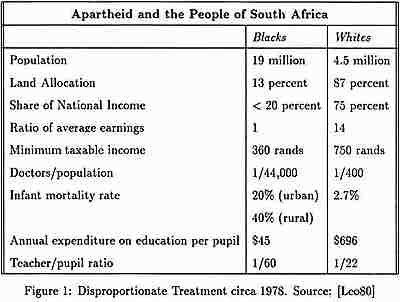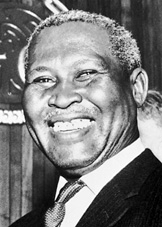Apartheid in South Africa really started to take off in the late 1940’s. The purpose of apartheid was to create a separation between races and white domination. As time went on the whites gained more power over the races and new laws started coming out against blacks. It got worse and worse, prohibiting whites and non-whites to marry.
 |
| A chart desribing the treatent of people in South (http://www-cs-students.stanford.edu/~cale/cs201/apartheid.hist.html) |
In the 1950’s, South Africa was separated into three categories, white, black, and coloured. To be considered white you had to look white and have both parents be fully white. Coloureds were people of Asian or Indian decent. A major way you could tell a person was white was by their speech, education and habits.
Each race had different rules and if they were not followed there would be a harsh consequence. If you were black you must be carrying a passbook with everything in check, if you weren’t there also would be a price to pay.
In 1951 homelands were created. “These homelands were independent states to which each African was assigned by the government according to the record of origin (which was frequently inaccurate).” In 1953, a law was passed that you could not protest against existing laws. If you were to break this law you would be fined, whippings, and other things.
 |
| A picture of Albert Luthuli (http://nobelprize.org/nobel_prizes/peace/laureates/1960/lutuli-bio.html) |
In the 1960’s an event occurred called “the Sharpeville massacre.” The Sharpeville massacre was a big group of blacks refusing to carry passbooks. This lasted 156 days, killing 69 people and 87 hurt. Apartheid is just a way to raise the power of whites and bring down any other races.
Albert John Luthuli was born in 1898, near Bulawayo, which is in Southern Rhodesia. He was the son of a Seventh Day Adventists Missionary. In 1908, Albert was sent to live in his ancestral home in Groutville, Natal. That is where he attended mission school. In 1920, Albert attended some courses at Adams College and later became part of the college staff. Albert remained at this college until around 1935.
Being experienced as a teacher, Luthuli believed that education should be available to all Africans, and that the quality of school for black children should be to same as that of a white school. In 1928, Luthuli became the African Teacher's Association's secretary. In 1933, he became the president.
In 1935, Albert was given the honour of being chief for the Groutville reserve. Although, it was not a hereditary position that landed him chief, Albert won through election. The following year, the government revealed ACT #16 of 1936, which removed black Africans’ from the voter’s role in The Cape. During the same year, the government released ACT #18 of 1936, which was called the “Development Trust and Land Act.” This act limited black Africans holding them to a small area of native lands.
Luthuli joined the ANC in 1944. The ANC was an organization intending to restore the rights of black South Africans to be equal to that of the white people's rights. In 1951, Luthuli became the president of the Natal Provincial Division of the ANC. In 1952, Luthuli was one of the main leaders of the defiance campaign. The defiance campaign was a non-violent protest against the pass laws. By the end of 1952, Luthuli was elected President General of the ANC. The last president was Dr. James Maroka, who lost support from all his voters when he claimed not guilty to criminal charges.
In 1952, Luthuli, Nelson Mandela, and about 100 other people were banned from the ANC. Luthuli’s ban was renewed in 1954. He was arrested in 1955, being one of 156 being arrested for high treason. After getting out of jail, Luthuli was re-elected as the ANC president in 1956. He was also re-elected in 1958.In 1961, Luthuli received the 1960 Nobel Peace Prize. From then on, Luthuli remained president of the ANC until July 21st, 1967, when he got hit by a train and died.
Page created on 3/7/2011 12:00:00 AM
Last edited 3/7/2011 12:00:00 AM
Chokshi, Monal. "The History of Apartheid in South Africa." [Online] Available http://www-cs-students.stanford.edu/~cale/cs201/apartheid.hist.html.
, Nobelprize.org. "Albert Lutuli - Biography." [Online] Available http://nobelprize.org/nobel_prizes/peace/laureates/1960/lutuli-bio.html.
